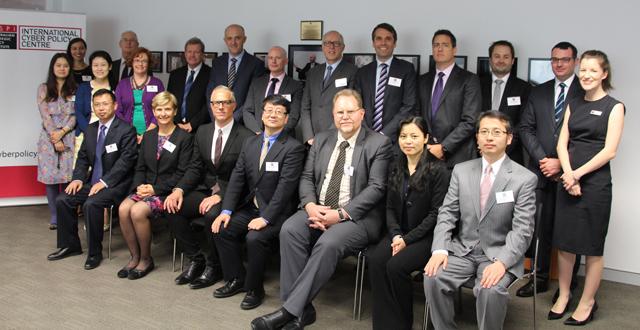Last week, ASPI hosted The China Institutes of Contemporary International Relations (CICIR) for the second ASPI-CICIR 1.5 Track Cyber Dialogue. ASPI welcomed representatives from CICIR, the Cyberspace Administration of China, CNCERT/CC, and the Chinese Ministries of Foreign Affairs and Defence to Canberra for a lively exchange on approaches to new and emerging cyber security issues.
Topics discussed with the Australian side—consisting of government and private sector cyber leaders including The Commonwealth Bank and Telstra—covered online crime, China’s new cyber legislation, opportunities for capacity building, the implementation of international law and norms and new avenues for cooperation.
The 1.5 track dialogue followed the official level Australia-China Cyber Policy Dialogue which took place the preceding day at the Department of Foreign Affairs, a short summary of which is available here.
Looking a bit further afield, the Telecommunications Regulatory Authority of India handed down a controversial decision yesterday to block Facebook’s ‘Free Basics’ program from operating on the sub-continent. Free Basics was designed by Facebook to help provide free internet access to those who couldn’t otherwise afford it. The program relies upon ‘zero rating’ by ISPs, whereby access to a limited number of sites and services is effectively ‘unmetered’ and free. This approach has drawn criticism from some who argue that it’s counter to the principal of net neutrality. The Indian government has agreed with that perspective, ruling against allowing any form of discriminatory access to the internet, regardless of the intention of the supplier.
The Internet Corporation for Assigned Names and Numbers has announced that its new CEO, Göran Marby, will be taking up the high profile role from May. Marby, who’s director-general of the Post and Telecom Authority in his native Sweden will make the move to Los Angeles to take over the role from outgoing head Fadi Chehade. The organisation, which currently manages the internet’s domain name system on behalf of the US government, is helping to transition this oversight function to a non-government organisation.
Staying in the US, President Barack Obama is set to request a significant bump in federal funding for cyber security programs. Rumours are rife that as part of the White House’s annual budget proposal, President Obama will seek to increase his request for cyber cash from last year’s US$14 billion to $19 billion. Those additional funds are expected to be diverted towards the creation of another high-level federal cyber security position, and the creation of a new commission on cyber security.
Across the Pacific, China’s powerhouse online marketplace Taobao, operated by internet giant Alibaba, was compromised recently when online criminals accessed over 21 million customer accounts. Using Alibaba’s own cloud server, the infiltrators used details stolen in previous unrelated attacks to access the Taobao accounts. Once compromised, the accounts were used to make fake reviews and fake bids on the e-bay like site. Alibaba refused to confirm how many accounts in total were infiltrated, but assured customers that most of the accounts remained protected.
And finally, if you’re with internet service provider TPG, you may have noticed a slowdown in your internet speed this week. This is due to a break in TPG’s Pipe Pacific Cable between Sydney and Guam. On 5 February, engineers received multiple alarms from the system indicating the break. TPG is routing its traffic through Optus’ Southern Cross Cable and Telstra’s Australian–Japan Cable while it makes repairs that are expected to take over a month.
